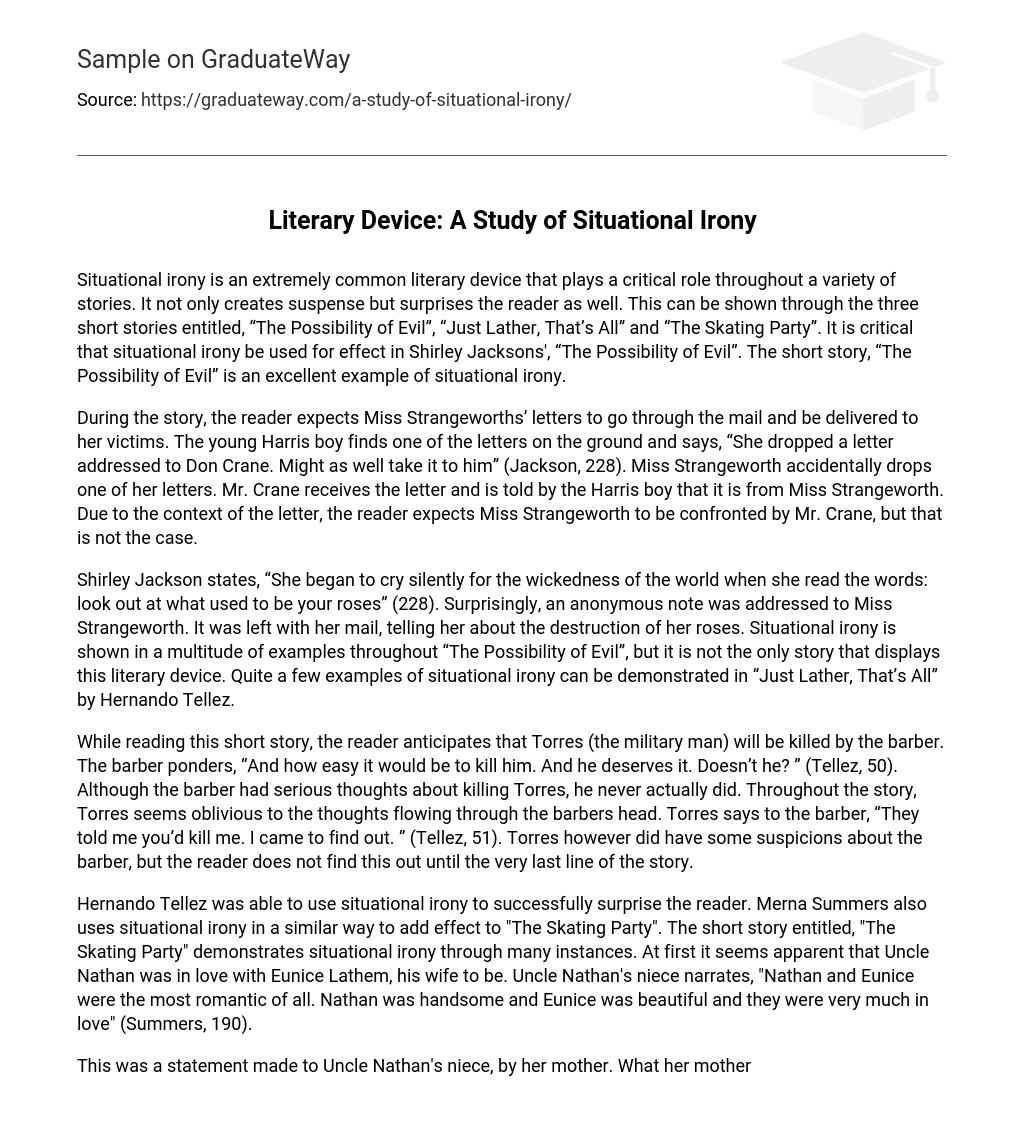Situational irony is a frequently used literary device that is essential to many stories. It adds both suspense and surprises to the reader. This can be seen in the three short stories: “The Possibility of Evil,” “Just Lather, That’s All,” and “The Skating Party.” Shirley Jackson’s “The Possibility of Evil” demonstrates the importance of using situational irony for effect. Overall, this short story serves as an excellent example of situational irony.
Throughout the story, the anticipation builds as the reader expects Miss Strangeworth’s letters to reach their intended recipients through the mail. Unexpectedly, one of the letters is discovered by the young Harris boy on the ground. He decides to take it to Don Crane, stating, “She dropped a letter addressed to Don Crane. Might as well take it to him” (Jackson, 228). Here, Miss Strangeworth accidentally drops one of her letters which ends up in Mr. Crane’s possession. Furthermore, the Harris boy informs him that it is from Miss Strangeworth. Given the contents of the letter, one would assume that Miss Strangeworth would be confronted by Mr. Crane, but this expectation is not fulfilled.
In “The Possibility of Evil”, Shirley Jackson reveals the protagonist, Miss Strangeworth, feeling sorrowful after reading a note about her destroyed roses: “She began to cry silently for the wickedness of the world when she read the words: look out at what used to be your roses” (228). Someone had left an anonymous note with her mail, informing her of this destruction. This incident highlights situational irony in the story, but it is not the only one. Another example of situational irony can be found in Hernando Tellez’s “Just Lather, That’s All”, where numerous instances can be demonstrated.
While reading this short story, the reader anticipates that Torres (the military man) will be killed by the barber. The barber ponders, “And how easy it would be to kill him. And he deserves it. Doesn’t he? ” (Tellez, 50). However, despite contemplating the idea of killing Torres, the barber never acts upon it. Throughout the story, Torres remains unaware of the thoughts crossing the barber’s mind. Torres expresses his knowledge of the rumor that the barber intends to kill him, saying, “They told me you’d kill me. I came to find out. ” (Tellez, 51). Nonetheless, it is only at the very end of the story that it is revealed Torres did have some suspicions about the barber.
Both Hernando Tellez and Merna Summers employ situational irony to surprise and captivate readers. In her short story “The Skating Party,” Summers effectively incorporates situational irony in various instances. Initially, it appears evident that Uncle Nathan has genuine affection for Eunice Lathem, his future wife. The narrator, Nathan’s niece, describes them as the epitome of romance, stating, “Nathan and Eunice were the most romantic of all. Nathan was handsome and Eunice was beautiful and they were very much in love” (Summers, 190).
This is a statement made by Eunice’s mother to Uncle Nathan’s niece. Unknown to her mother, Uncle Nathan is actually in love with Eunice’s sister, Delia. When Eunice and Delia fall into the ice, it seems like Nathan grabs the first pair of hands he can reach. It doesn’t appear that he has a choice. Uncle Nathan says, “But I could see their hands on the edge of the ice, one pair of arms had white fur around them. And I grabbed the other pair” (Summers, 199). However, Uncle Nathan does have a choice.
In “The Skating Party,” the protagonist deliberately chooses Delia’s hands out of the different pairs of hands he could see. Throughout the story, situational irony is used to illustrate the contrast between what actually happens and what was expected to happen. This twist in the plot is effectively used in various ways. The stories “The Possibility of Evil,” “Just Lather, That’s All,” and “The Skating Party” all provide multiple examples of situational irony. While these are just a few examples, there are many other short stories that also incorporate situational irony.





